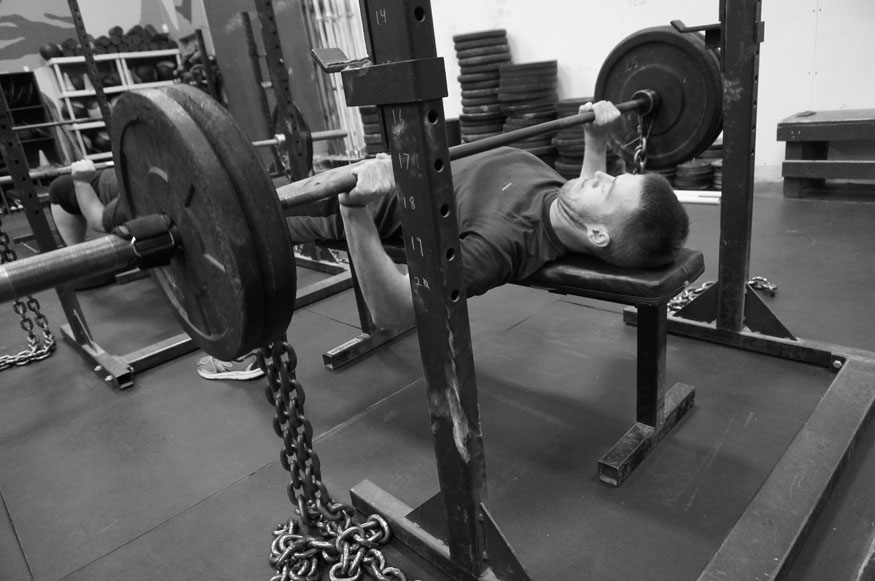
By Rob Shaul
When I wrote this article, I was moving back into barbell strength training after several months of endurance, dumbbell and bodyweight work. I was going to continue to train endurance, which would limit my strength training to just two days a week. So I needed to make my strength work as efficient and effective as possible.
The Basics
I need to train upper body pressing strength, upper body pulling strength, lower body pressing strength, and lower body pulling strength. Here are the barbell exercises I’ve chosen:
- Upper Body Press: Bench Press
- Upper Body Pull: Weighted Pull Up
- Lower Body Press: Front Squat
- Lower Body Pull: Hinge Lift
Why these exercises?
Bench Press – Simple, great strength builder, and I like benching. As well, I’ve found that for a balanced athlete, there is a strong correlation between their bench press and front squat, so by doing both bench press and front squat in this cycle, I can monitor my own strength balance. Why not a standing military press or push press. Many coaches prefer one of these as the best measure of upper body strength, but in my years of coaching, I’ve found both put a lot of stress on the low back area, and have worked not to program military or push presses in the same session as hinge lifts. So I went with the bench press.
Weighted Pull Up – Simple, and using a backpack, really easy to progress – I can increase load 2.5 pounds at a time using a tiny plate. We have a functional gym set up and I don’t have a lat pull down machine, which could have been an option. I could have also chosen reverse bench presses or heavy bent over barbell rows, but I’ve found it’s pretty hard to do these exercises heavy, without just a little jerking and bucking. There’s not hiding from a strict, weighted pull up.
Front Squat – As mentioned above, front squat and bench press loading should be close for balanced athletes, so doing this exercise with the bench press in the same cycle will give me an indication where I stand. The front squat is my favorite lower body squatting movement because of it’s focus on the quads and butt, the way it builds core strength, and transferability to power lifts like the hang squat clean. Why not the back squat? Many coaches refer to the back squat as the best, overall squatting movement and they could be right. But I’ve found the back squat is more of a total body exercise – it seems to recruit more posterior chain than the front squat. Also – I’ll be lifting alone, and I can always escape from the barbell doing heavy front squats by dumping it forward. This isn’t so easy with the back squat. One problem with the front squat for some men is wrist flexibility.
Hinge Lift – The Hinge Lift is my iteration of the Romanian Dead Lift, and I prefer it over the traditional deadlift because I found it’s safer, and seems to train the butt and hamstrings more. The traditional deadlift recruits more quad than the Hinge Lift, and I’m hitting the quads already wight he front squat.
The Program
I’ll be using an 8×3 set/rep scheme, our Big 24 progression methodology, and supersets during this cycle to make things efficient, and do this session 2x/week – Tuesdays and Thursdays.
Supersets – I’ve got an hour to train, and wouldn’t be able to get all my sets in if I trained each exercise alone, in order. So I’m supersetting Front Squats with Weighted Pull ups, and Hinge Lifts with Bench Press. For example, in the first circuit, I’ll do my Front Squat reps, then Weighted Pull up reps, then a stretch as working rest between rounds.
By super setting a lower body and upper body exercise together, I’m able to still go heavy, yet grind through this training session without undue rush, and finish in 60 minutes.
The Big 24 progression methodology has been proven over the years as simple, but hard and effective strength training progression. Big 24 deploys an 8×3 set/rep scheme for each exercise. The first training session (Session 1), you work up in loading steadily on each exercise until 3x reps are “hard but doable” – and record that load.
In the two next subsequent sessions (Sessions 2-3), drop 10 pounds from your finishing load, and use this reduced loading for rounds 4-8.
Session 3-4, add 5 pounds to the barbell for each exercise and use this loading for rounds 4-8.
Session 5-6, add another 5 pounds to the barbell for each exercise and use this loading for rounds 4-8. This load matches your finishing load for Session 1.
Let’s say these were your finishing loads after Session 1:
- Front Squat – 225#
- Weighted Pull up – 40#
- Hinge Lift – 300#
- Bench Press – 225#
Here’s what Session 2 would look like:
Warm Up:
3 Rounds
Barbell Complex at 65#
Instep Stretch
Training:
(1) 8 Rounds
3x Front Squat
3x Weighted Pull Up
Hip Flexor Stretch
Loading:
Round Front Squat Weighted Pull Up
1 135 10
2 165 15
3 195 20
4-8 215 30
(2) 8 Rounds
3x Hinge Lift
3x Bench Press
Lat + Pec Stretch
Loading:
Round Hinge Lift Bench Press
1 165 135
2 225 165
3 255 195
4-8 290 215
(3) Foam Roll/Stretch as needed